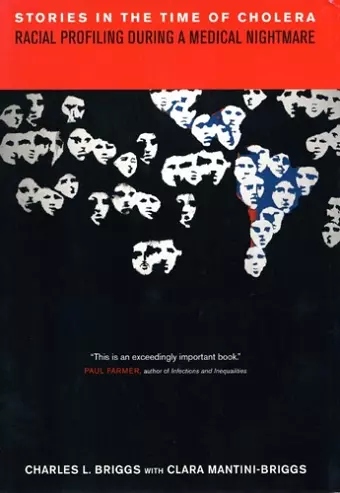Stories in the Time of Cholera
Racial Profiling during a Medical Nightmare
Format:Paperback
Publisher:University of California Press
Published:17th Sep '04
Should be back in stock very soon

Cholera, although it can kill an adult through dehydration in half a day, is easily treated. Yet in 1992-93, some five hundred people died from cholera in the Orinoco Delta of eastern Venezuela. In some communities, a third of the adults died in a single night, as anthropologist Charles Briggs and Clara Mantini-Briggs, a Venezuelan public health physician, reveal in their frontline report. Why, they ask in this moving and thought-provoking account, did so many die near the end of the twentieth century from a bacterial infection associated with the premodern past? It was evident that the number of deaths resulted not only from inadequacies in medical services but also from the failure of public health officials to inform residents that cholera was likely to arrive. Less evident were the ways that scientists, officials, and politicians connected representations of infectious diseases with images of social inequality. In Venezuela, cholera was racialized as officials used anthropological notions of 'culture' in deflecting blame away from their institutions and onto the victims themselves. The disease, the space of the Orinoco Delta, and the 'indigenous ethnic group' who suffered cholera all came to seem somehow synonymous. One of the major threats to people's health worldwide is this deadly cycle of passing the blame. Carefully documenting how stigma, stories, and statistics circulate across borders, this first-rate ethnography demonstrates that the process undermines all the efforts of physicians and public health officials and at the same time contributes catastrophically to epidemics not only of cholera but also of tuberculosis, malaria, AIDS, and other killers. The authors have harnessed their own outrage over what took place during the epidemic and its aftermath in order to make clear the political and human stakes involved in the circulation of narratives, resources, and germs.
"This harrowing and beautifully written account chronicles a complex array of social responses to an epidemic and shows us what an engaged and responsible anthropology can offer those seeking to understand and prevent such plagues - and the injustices that foster them." - Paul Farmer, author of Pathologies of Power"
ISBN: 9780520243880
Dimensions: 229mm x 152mm x 28mm
Weight: 680g
456 pages